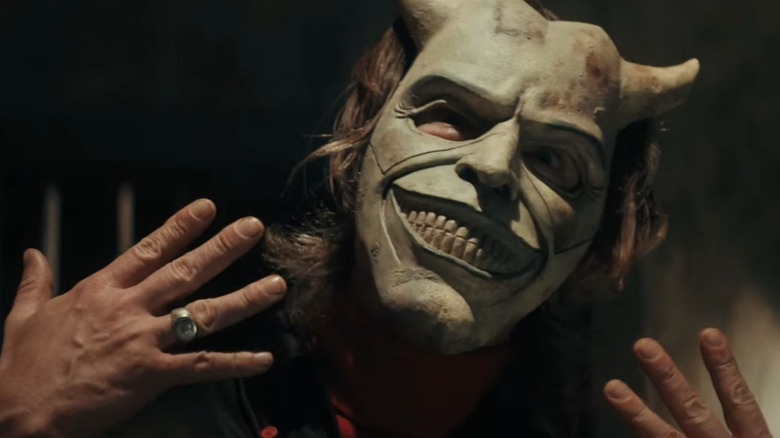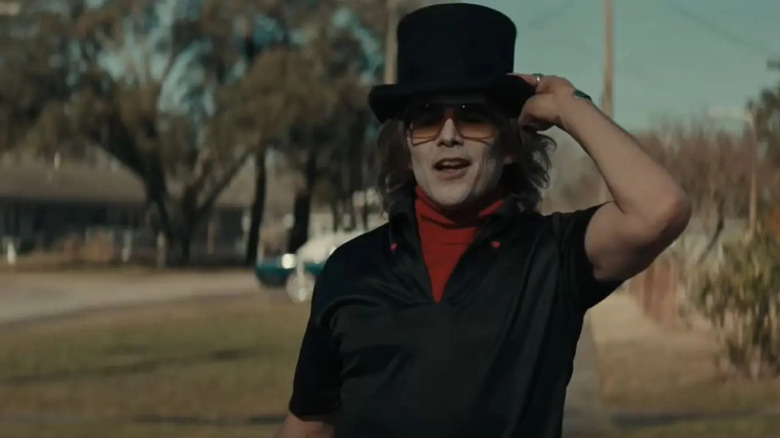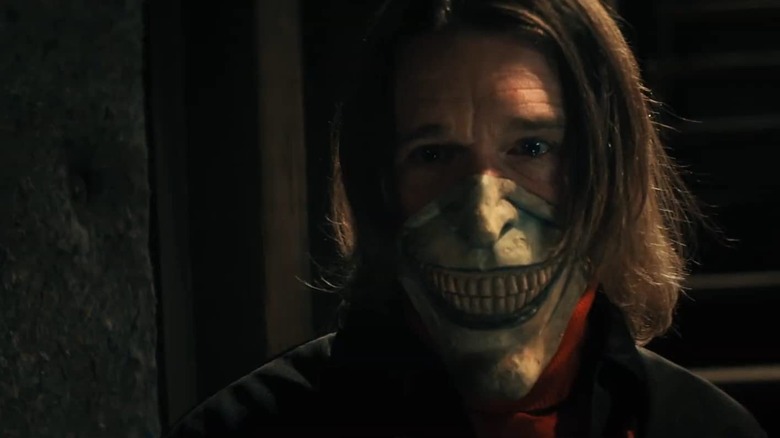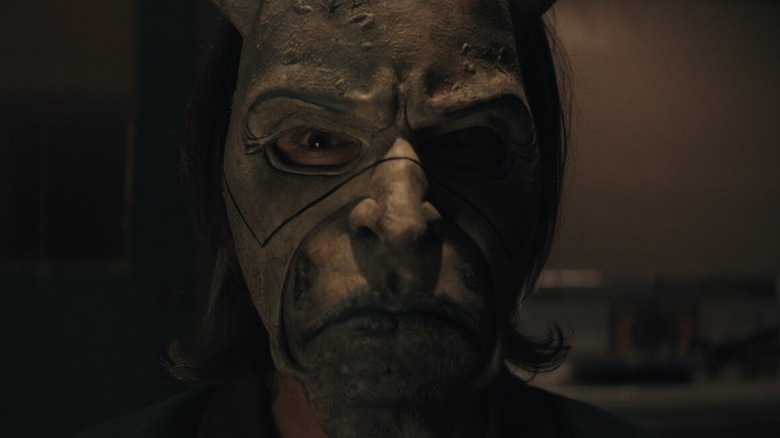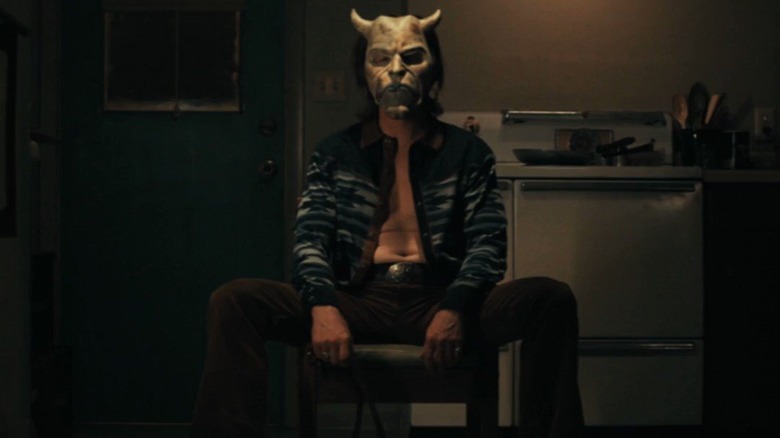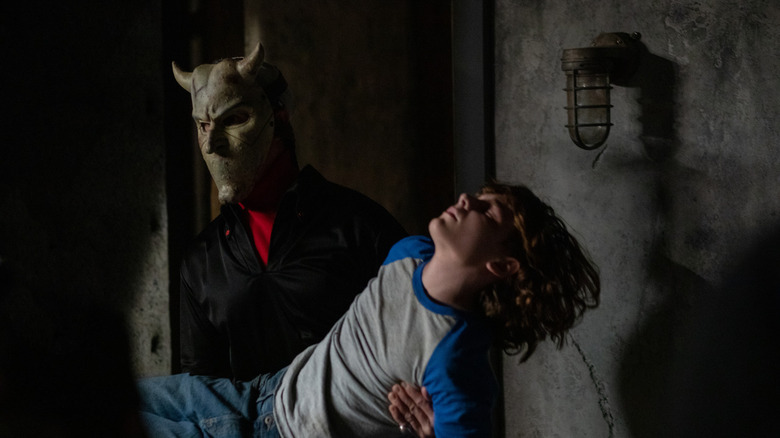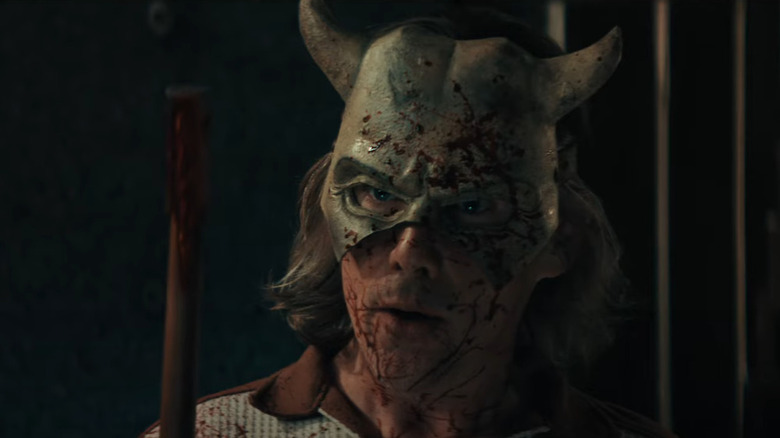The Grabber, 'Gayface,' And The Danger Of Conflating The Two In The Black Phone
Content warning: This article discusses homophobia, pedophilia/hebephilia, and child abuse at length and contains spoilers for "The Black Phone."
When John Wayne Gacy was apprehended in 1978, his modus operandi of targeting teenage boys and history of working as a part-time clown turned him into one of the most notorious and recognizable figures in criminal history. His crimes were partially responsible for the introduction of "stranger danger" discussions, the idea of a house having a crawl space became subject to paranoia, and his horrific reign of terror became the inspiration for the "Galesburg Grabber" in Joe Hill's short story, "The Black Phone." For the uninitiated, Joe Hill is the son of master of horror Stephen King, and given the resurgence in popularity of King's most iconic monster following the releases of "It" and "It: Chapter Two," Hill and the creative team behind the film adaptation of "The Black Phone," director Scott Derrickson and writer C. Robert Cargill, made the wise decision to change The Grabber's occupation from "part-time clown" to "part-time magician."
This change is a good thing in that it allows "The Black Phone" to stand on its own and out of the shadows of both Stephen King's "It" and the easily identifiable connection to John Wayne Gacy. However, the flamboyance of magicians and the current state of political unrest in the United States has caused some people to make an alarmingly dangerous read on the film adaptation of "The Black Phone." When discussing John Wayne Gacy, we refer to him as a serial killer, a hebephiliac, and a necrophiliac, but what we don't call him is "gay," because he wasn't. So why are some people calling Ethan Hawke's performance of a character inspired by him "gayface?"
What is 'gayface?'
Gayface is the term used to describe a straight actor performing a caricature of a gay person by playing into harmful tropes. Admittedly, there desperately needs to be a different name for this practice, as equating gayface to the unforgivably disrespectful "Blackface" is like comparing apples to 400 years of systemic racism, but for the time being, that's the term we have. Gayface is not only an offensive practice that relegates the representation of queer people in the media to painful stereotypes, but also denies queer actors the ability to tell their own stories while implying that there's only one type of way to be gay.
I first heard about the claims of gayface in "The Black Phone" following its premiere at Fantastic Fest in 2021, and again after the Beyond Fest screening a few weeks later. To say I was disappointed was an understatement, considering I've been obsessively singing the praises of Derrickson, Cargill, and Hawke's first horror collaboration, "Sinister" for a decade. I walked into the theater to see "The Black Phone" expecting to have my heart broken by creators I had championed for years, only to find myself getting actively angry at the abhorrent and inaccurate allegations cast against this film that are definitely going to be parroted by bigots and queer-mongering evangelicals, and believed as fact by well-meaning straight people who aren't familiar with queer theory but don't want to support something labeled as "problematic."
Calling Hawke's performance in this film "gayface" is a take devoid of any nuance.
Where did this take come from?
I went in to my second viewing of "The Black Phone" with the sole intention of trying to clock any and all instances of Ethan Hawke's performance that could have been perceived, read, or coded as gay. Before I list them all out, please understand that these attributes are not inherently or exclusively "gay," because there is no one way to be, act, look, present, or exist as gay, and to imply otherwise is homophobic.
- The Grabber speaks to his victims in a sweet, soft, and higher-pitched tone.
- The Grabber often dramatizes his speech with flared finger/hand gestures.
- The Grabber is a man who lives alone in the 1970s (until his brother moved in).
- The Grabber carries himself with effeminate posture.
- The Grabber's game with his victims is called "Naughty Boy."
- The Grabber's victims are exclusively young men.
Believing these aspects make the Grabber a gay caricature is so unfathomably harmful it honestly makes me physically ill. In a different genre and with a lesser creative team, I would completely understand why someone would come to this conclusion, but because Derrickson and Cargill aren't homophobic monsters, all of these supposed gayface attributes are explained in the text of "The Black Phone." The Grabber is so clearly portrayed as a hebephiliac serial killer, not a gay man, and conflating the two gives legitimate power to the oppressive talking points of those who are sincerely trying to exterminate the existence of queer people in real life.
The text disproves the gayface claims
It's mentioned that the room The Grabber uses to harbor his victims is from his childhood. Abuse is often cyclical, and the script indicates The Grabber's actions are a result of his own unhealed trauma after having been a victim of abuse himself. This is likely why his victims are all young men, as he was a young man himself when he experienced abuse, and the "Naughty Boy" game is just a continuation of the abuse he endured as a child. He's placed himself in the power position he was unable to do in his younger years. It's not an excuse and he certainly doesn't get a pass, but it explains why he is the way he is.
As we aren't given a full psychological analysis or criminal profile, trying to pathologize him further is both irresponsible and impossible.
The Grabber's voice changes depending on who he's talking to. With his victims, he puts on a gentle demeanor with a higher tone, something adults do in general when talking to children. It's an attempt to disarm the victim and make them feel like they're safe, not an indication of queerness. When he kidnaps Finney (Mason Thames), he acts silly when dropping his groceries. If he was using the aggressive and "macho" voice he uses with his brother, Finney would have avoided him. As for the posturing and hand motions? He's a part-time magician. He's a showman. He's putting on a performance for his victims and his finger movements are nearly identical to the sleight of hand used when performing close-up magic.
The complication of reclamation
Given horror's complicated relationship with queer presentation, many of us have found ways to reclaim the monstrous ways our community and identities have been shown. I say this as someone who has a portrait of Countess Marya Zaleska of "Dracula's Daughter" tattooed on my forearm. There's power in owning up to the villainous characters created to try and make us feel lesser than, and a catharsis in seeing these villains enact the anger and rage we often don't get to unleash for the sake of not giving bigots any additional reasons to hate us, finally affirmed on screen.
There are some queer people who have been reveling in Hawke's performance, understanding that he's a monster but delighting in the exaggerated personality of the role. And that makes "The Black Phone" an even more complicated movie to assess in terms of the gayface accusations and queer reads that are undoubtedly going to be made in the current climate. I ran some of these thoughts by lesbian film writer Annie Rose Malamet – who specializes in the queer, perverse, and controversial — who loved the film, but admitted, "I do think it's something we'll be looking at in 20 years when we study media and this moment." She's right. Wholeheartedly. "The Black Phone" was supposed to be released in January and the landscape regarding LGBTQIA+ rights has completely changed during the release delay. It's impossible to know how the film would have been received had the pandemic not forced a delay and it came out before "Don't Say Gay," and the obvious delegitimization of the Supreme Court.
The danger of giving bigots unneeded ammunition
We are currently living in a time when anti-gay legislation is popping up all over the country, and Anita Bryant-esque beliefs have returned as right-wing talking points. Gay people are being called "groomers" constantly, so ignoring the reality that The Grabber is a hebephiliac and instead equating him to gayface is playing right into the hands of conservatives who want us dead. It's also wildly dangerous because there is zero evidence that shows any connection to homosexuality and child abuse, and the overwhelming number of those who abuse children are actually straight men. However, it's important to note that pedophilia/hebephilia are the words used to describe the attraction, and not the action, despite the fact culturally the words are often used interchangeably.
"The Black Phone" was released in the middle of a moral panic surrounding homosexuality (and specifically, trangenderism) and it would have been impossible for Derrickson, Cargill, and Hawke to have predicted how infuriatingly backward America was moving when developing the character. Unfortunately, I've seen this conflation made not just by straight people, but also queer people who should absolutely know better. There is a dark and twisted history in the way entertainment has portrayed the queer community, and there is a direct correlation between our representation and they way we are treated by society at large. Any portrayal of a man victimizing boys is going to stir up subconscious associations of that historically bad representation, but that's not the fault of Derrickson, Cargill, or Hawke.
It's the fault of people's unable to differentiate between actual queerness and depictions of queerness.
Hawke's performance is phenomenal, but it's not inherently gayface
Claiming Hawke's flamboyant performance is gayface is an extremely reductive way at assessing queerness, and an even more limiting approach to gender performance. Our culture struggles enough as-is not associating anything outside of the aggressively masculine as "gay," which has only continued keeping us all in rigid gender role boxes none of us asked for. Ethan Hawke should be able to play a flamboyant predator without being accused of gayface, especially when playing a character that is by all textual support, not gay. Associating his performance with a caricature of a gay man honestly says a lot more about the viewer than it does the performer.
The sick, sad reality is that it wouldn't have mattered how Hawke portrayed the Grabber — he was always going to be associated with homosexuality by fear-mongering bigots simply because of the nature of his crimes. Saying that his performance should have been "straighter" will not save us because conservatives are just going to continue moving goal posts. We are never going to score if we continue playing their game. The Grabber is a hebephiliac child murderer. Period. And yet people are still willfully falling into the trap of associating dramatic flair with queerness. Bigots already hate us, a serial killer in a movie isn't going to change that.
Stop helping them write their playbook with bad faith interpretations.
